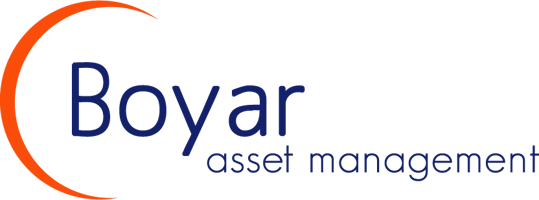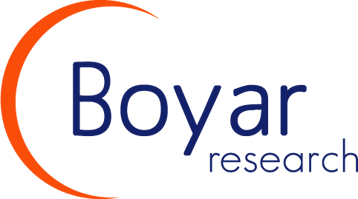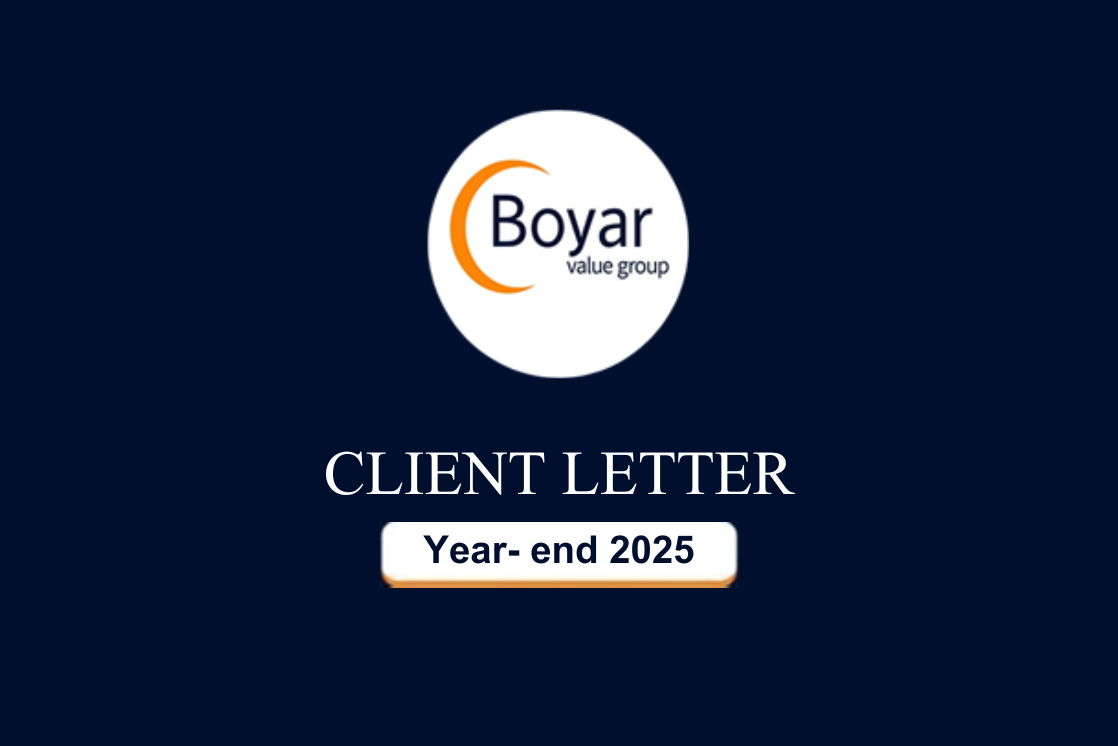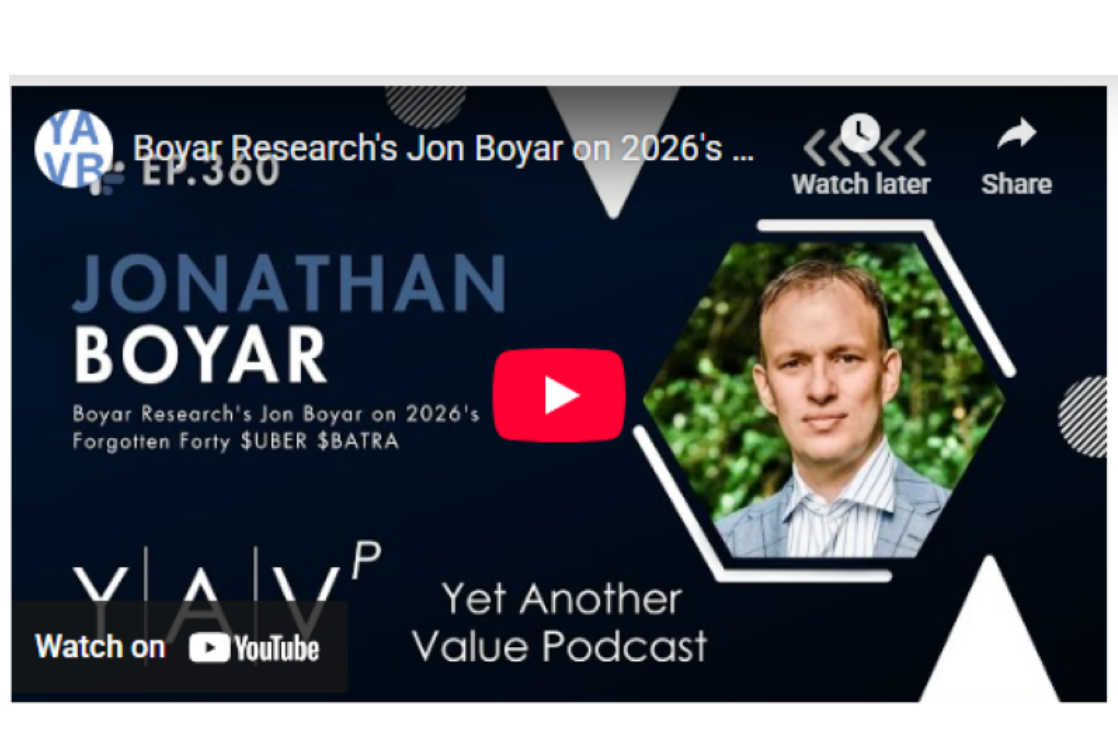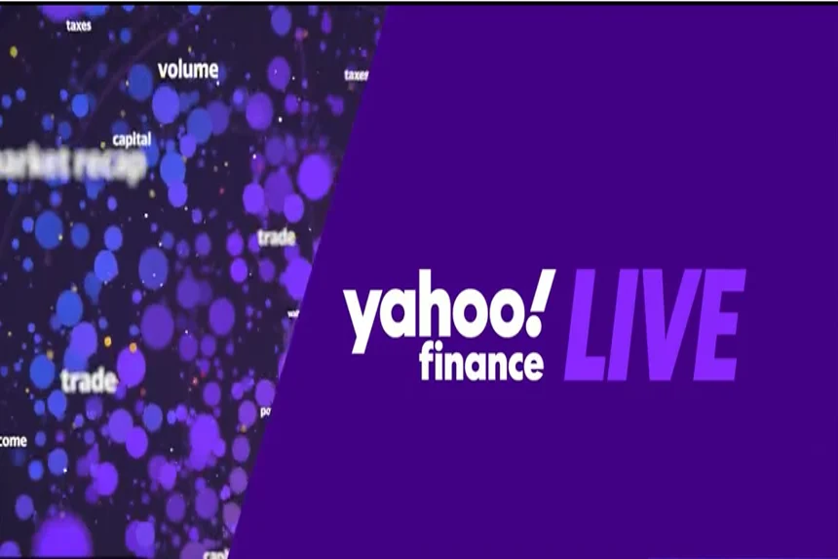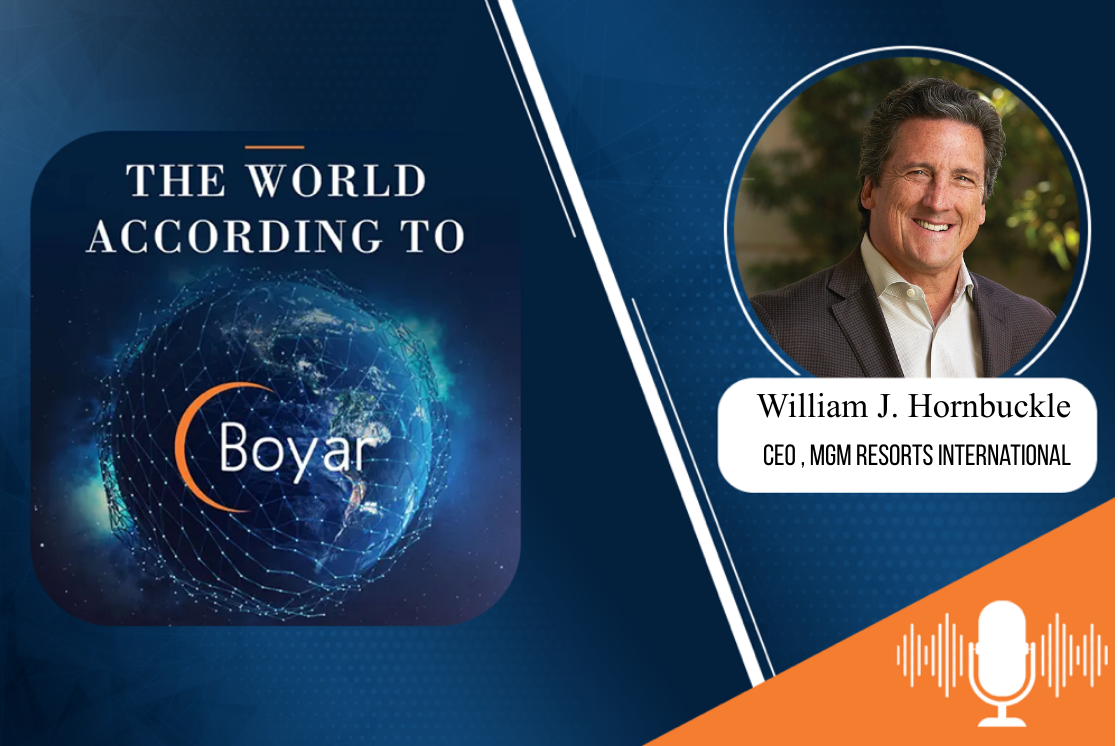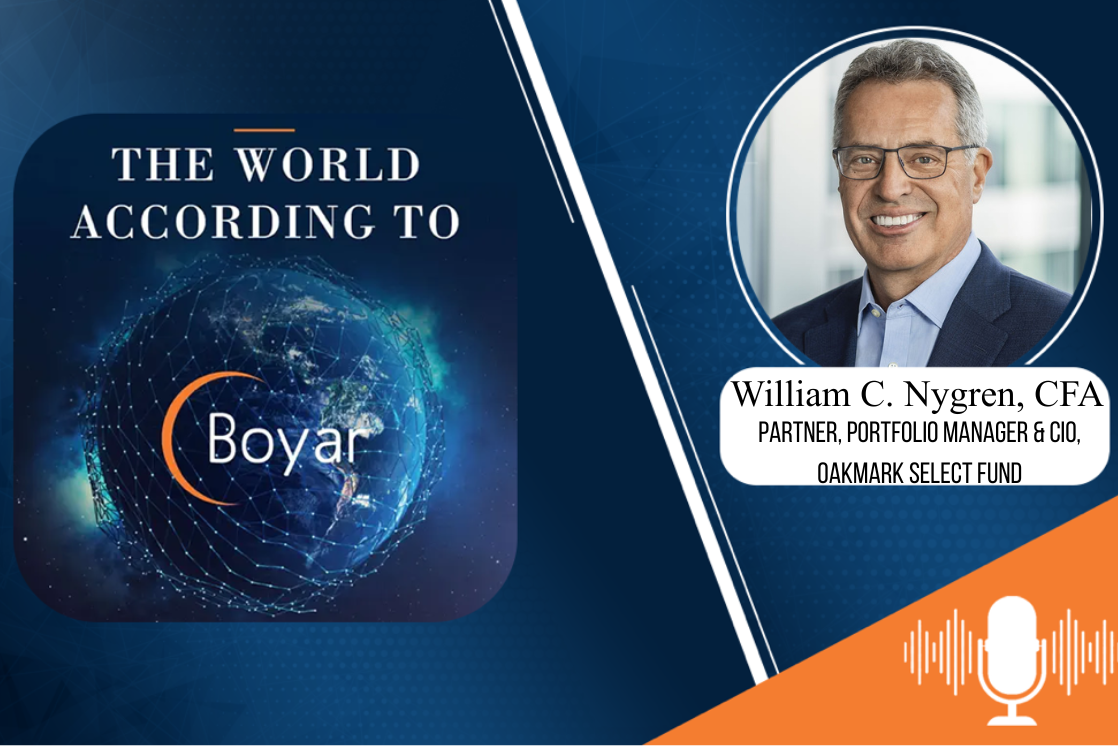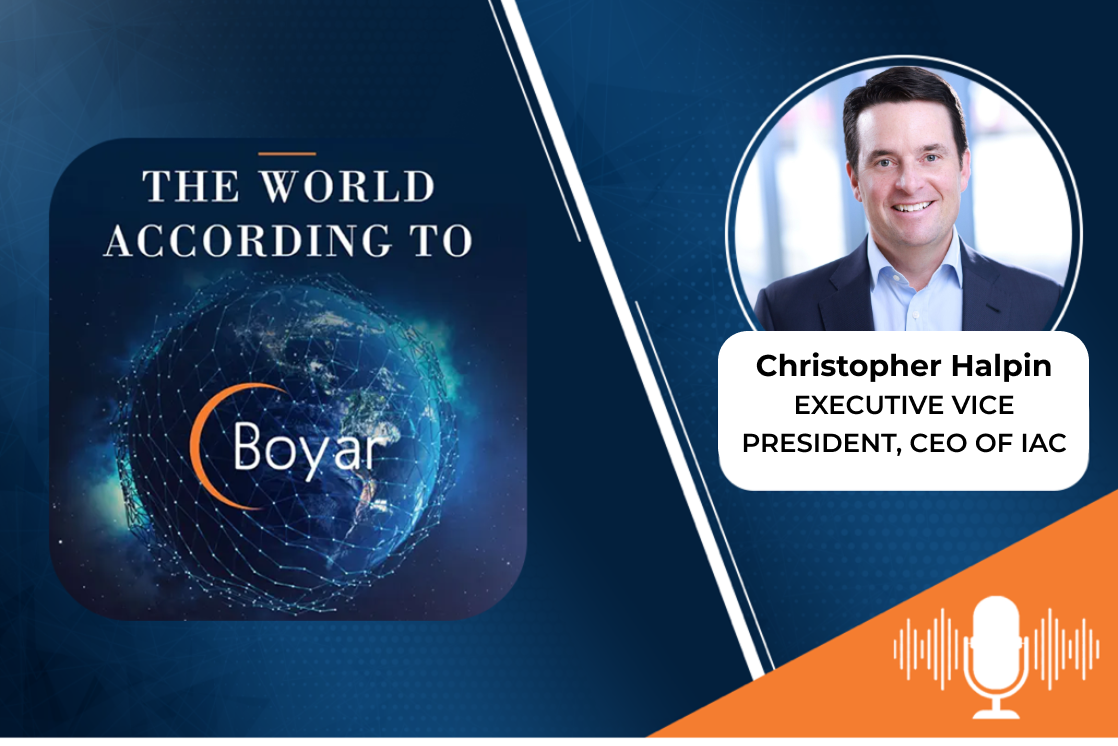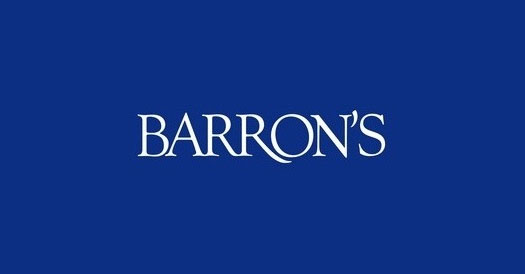Inside IAC: Chris Halpin on Unlocking Value in Turo, Dotdash Meredith, and the Future of Digital Media
Never miss another podcast. Click here to subscribe today to Boyar’s Substack and get all the new podcasts sent straight to your inbox.
Episode Summary:
Episode Summary:
In this episode, Jonathan Boyar welcomes Chris Halpin, Executive Vice President, Chief Operating Officer, and Chief Financial Officer of IAC—a holding company known for its savvy capital allocation and track record of building internet leaders like Expedia, Match Group, and Ticketmaster.
Chris brings a unique perspective shaped by senior roles at the NFL and Providence Equity before joining IAC. He and Jonathan explore how IAC is navigating today’s market, why the stock is significantly undervalued, and how the company is positioning key holdings like Dotdash Meredith, Turo, and Care.com for long-term success.
Whether you're an investor, media strategist, or just someone fascinated by the business of the internet, this episode offers a front-row seat to how IAC is building value in unconventional and often overlooked digital businesses.
Topics Discussed
- Chris’s unique journey from private equity to the NFL to IAC
- The transformation of Dotdash Meredith
- The business case behind IAC’s OpenAI partnership
- How IAC is thinking about Turo’s valuation, growth trajectory, and timing around a potential IPO
- Margin structure and monetization strategy in digital media
- IAC’s approach to valuation, capital allocation, and market mispricing
- “Sacred cows” and how IAC avoids them
- Lessons from working with media rights at the NFL
- Why Chris thinks IAC is trading at a dramatic discount to fair value
About Chris Halpin:
Christopher Halpin is Executive Vice President, Chief Operating Officer and Chief Financial Officer of IAC. Mr. Halpin leads corporate finance, accounting, M&A, investor relations, and administration functions while also overseeing the day-to-day function and execution of IAC’s businesses.
Prior to his appointment at IAC, Mr. Halpin spent nearly a decade in leadership roles at the National Football League (NFL), most recently serving as Executive Vice President, Chief Strategy & Growth Officer. In this role Mr. Halpin oversaw strategic planning and data and analytics, as well as key growth areas, including managing the NFL’s international business and leading its legalized sports betting strategy. Other past leadership roles at the NFL include Senior Vice President, Consumer Products & Licensing, and Vice President of Media Strategy & Business Development.
Before joining the NFL in June 2013, Mr. Halpin was a Partner and Managing Director at Providence Equity Partners. During his 13 years at Providence, Mr. Halpin worked across the firm's investment activities in the Media & Entertainment, Wireless/Satellite and Business Services sectors, and also opened and served as Co-Head of the firm's Hong Kong office. Mr. Halpin started his career in the Merchant Banking Division of Goldman Sachs & Co.
Mr. Halpin is a graduate of Princeton University with an A.B. in Economics (Phi Beta Kappa, Magna Cum Laude), and is a board member of Turo, the Children's Scholarship Fund, the Ladies Professional Golf Association (LPGA), and the Western Golf Association/Evans Scholarship Fund.
Click Below to Read the Interview Transcript
Transcript of the Interview With Chris Halpin:
[00:00:00] Boyar: Welcome to the World according to Boyar, where we bring top investors, bestselling authors, and business leaders to show you the smartest ways to uncover value in the stock market. I'm your host. Jonathan Boyar. The following is provided by Boyar’s Intrinsic Value Research and is for general informational purposes only, and should not be construed as investment advice.
[00:00:26] Any opinions expressed herein represent current opinions of Boyar research. Only Boyar research assumes no obligation to update or revise such information. Investing in securities involves risk, including the possible loss of principle. Past performance does not guarantee future results. Employees of Boyar Research or clients of an affiliate may own shares.
[00:00:41] In any company discussed, Our guest today is Christopher Halpin, executive Vice President, chief Operating Officer, and Chief Financial Officer of IAC.
[00:01:06] Prior to IAC, Chris spent nearly a decade in senior leadership roles at the National Football League before the NFL. He was a managing director at well-regarded private equity firm, Providence Equity Partners. With that said, let's get to the episode. I hope you enjoy the conversation. Chris, welcome to the show.
[00:01:29] for having me. So in the interest of full disclosure, my clients and I own chairs in IAC. We've written extensively about the company and our institutional research service, Boyar research. So I just want to get that out of the way for any compliance issues. And before discussing IAC just first wanted to go through your time at the NFL, which to me is fascinating and.
[00:01:52] A New York Times article, it actually said you were reported to be a potential successor to Roger Goodell, which seems pretty cool.
[00:01:59] Chris: Fake news. It was a wonderful experience. The first 15 years of my career were private equity and I really, as you said, grew up at Providence Equity Partners, who were great guys.
[00:02:08] I'd been there for a while and had a great experience going to Asia, came back to the US and was just kind of bored. And one of my mentors, Michel Angelus, connected me. With Roger Goodell in 2012, and I'd always greatly respected how the NFL had managed its media rights, its brand, its scale, and we hit it off.
[00:02:29] And I decided, I joined, went way backwards on title and comp and all that, but my wife is a saint and I had a great experience, Roger. Was true to his word. He said, come in and if you perform, I'll give you a lot of different experiences. And so I started in media strategy and business development for the US rights deals, NFL Network.
[00:02:47] RedZone then oversaw consumer products and licensing, and then they made me chief strategy officer and then they added growth. So I had strategy data and analytics. Everything, international sports betting and another grab bag of stuff. Great experience, incredibly smart, dedicated people with a real passion for what they do, and I loved it.
[00:03:09] It was very energizing and just a great move.
[00:03:13] Boyar: You mentioned you were kind of involved with the sports betting part of it. Are you surprised like how Foley, the NFL and other leagues have kind of embraced sports gambling? Well,
[00:03:23] Chris: I would say two things. When you say holy, there's a lot of texture to that. So if you go back to 2017, 18, it was very clear that the Supreme Court was gonna strike down paspa.
[00:03:34] Rarely do you have the most liberal and the most conservative judges both basically strongly question one side, and so. We spent a lot of time thinking about how should we position ourselves. The PASPA would get struck down and Jersey would be in sports betting, but then it was gonna be this slow progression across the country in certain states like Utah and others would never, I.
[00:03:58] Legalized sports betting. And so we spent a lot of time thinking about how that would roll out. We spoke to a lot of other sports leagues and I think the countries that had gone through legalized online sports betting previously, the sports leagues and properties were incredibly willing to share what they did well and poorly, partly 'cause it had been so bruising for them.
[00:04:20] Think UK, Australia, a lot of EU countries. And the key takeaway was. You have to be involved, and I won't name the properties, but Major Global Properties said we did it at an arm's length basis. Initially, we didn't want to be involved. It went in directions that we were very unhappy with when it came to integrity, when it came to brand marketing, all these things.
[00:04:47] And also problem gaming, which is the big element. And it sort of ended up in a ditch and we all suffered for it. So where we ended up in the NFL. Was a gradual plan. Now we're in 2025, so this seems like a long time ago, but as legalization happened, 'cause we are a national fan base, when he got to about 50% of the country having legal access to online gaming, have it be more.
[00:05:12] Integrated into the overall media experience. Don't have it pollute your game 'cause it had killed soccer, it had killed uk. Have relationships with the books so that they had a vested interest. Also drive investments and awareness of problem gaming and be very active in legislative development. Look, the NFL's never gonna get credit or the benefit of the doubt on a lot of stuff.
[00:05:35] I think they've done a very good job of. With the migration, they're gonna get criticized of being too conservative or too aggressive, and it's just real politic. You gotta deal with it 'cause it's gonna be there.
[00:05:47] Boyar: I just have a couple more questions because I'm fascinated with this. We own chairs in Madison Square Garden Sports, which owns the Knicks and the Rangers, as well as Atlanta Braves Holdings, which owns the Braves.
[00:05:59] I saw a couple days ago, 6% stake in the 49ers. Just went first, $8.6 billion.
Chris I actually bought it. I bought it. Just kidding.
Boyar: Which seems absurd. What are your thoughts on valuations there and did you ever think it would get that way?
[00:06:15] Chris: Well, I was involved in ownership transactions a bit at the league, happened before I was, but the Panther Sale in 2018.
[00:06:24] You know, you could see there was a limited number of buyers. So you've got the dynamic. Certain teams go on and they've got a huge home fan. They happen to have a lot of in-market billionaires or distributed billionaires. The Panthers didn't have that as much. There were sort of three active bidders, but it was light.
[00:06:43] I. And as is his incredible track record, David Tepper made a great investment, obviously, but you could see that with where. Policies were on ownership from a number of limited partners, debt, financing, no access to institutional capital, et cetera. You would just keep limiting the number of buyers. The NFL still has the most restrictive rules because they care very much about it being a partnership of 32 31 owners or.
[00:07:14] One dual owner and then the Packers very, very thoughtful about it. But what you're seeing, I really think is any asset when you introduce liquidity. You get significantly more bid. Now, there's certain opaque elements to that, you know, like how trading cards were before eBay came along. But when it comes to premium assets that are non commoditized, I think what you're seeing is the introduction of, and it's not massive liquidity, right?
[00:07:42] You don't have the retail market playing in these sports teams, but you're introducing greater liquidity. And different types of investment capital such as sixth Street and what our Coast has done and others, and you're seeing increased valuation. I always said if you work at the NFL, whatever your analogy is, you're born on third base.
[00:08:03] You're standing on the shoulders of giants. You have the greatest model in sports. In a lot of ways it's sort of socialism masquerading as capitalism, but with the revenue sharing, the national revenue, the salary cap. Roger has done an incredible job of getting the union aligned, the owners aligned and into that model.
[00:08:23] And so in that, and there's limited number of games. Every game is meaningful and every team has hope. So in that vein, I. I totally get why the sports teams are so valuable. I also am a believer in the women's sports boom. I mean, valuations can always go crazy. Some of the other leagues, I think it's very much either end of the spectrum of an incredible property.
[00:08:44] I mean, Knicks and Rangers are extraordinary, and then weaker teams in some of the other leagues can lose a lot of money. So I think there'll be greater spread and values as you go.
[00:08:55] Boyar: No. Absolutely. And I now, I guess for the main event, let's talk about IAC for those unfamiliar, can you just give, you know, a high level view of what IAC is because there's been a lot of changes recently.
[00:09:07] Chris: Yeah. So IAC is a digital media holding company founded by. Barry Di originally a company he took over called Silver King and Barry has come out with his autobiography who knew? And he talks about this in the book and it's an excellent read for anybody hearing this for business life goals, everything.
[00:09:29] But he really saw, uh, home shopping network and saw what was possible through interactivity and that. Bled into internet and then drove into tremendously successful investments, holdings owned companies, Expedia, LendingTree, match Group, et cetera. We just did our 10th spin in Angie, our 10th standalone public company, and Angie, and it's very much a model of use capital to acquire businesses of all different size, build them up.
[00:10:01] Whether organically or through m and a and then spin them off to investors and have them live there and in some companies we sell, et cetera. The company has reinvented itself constantly. I joined in 22, IAC had just done the match spin and the Vimeo spins, and we just acquired the end of the prior year, Meredith, which was a large acquisition, and then we had Angie, and then we've got a variety of other holdings right now.
[00:10:28] Since spinning, Angie, our largest holdings are Dot Dash Meredith, which is the largest digital publisher doing about 1,000,000,007 of revenue, 300 million of ebitda, strong leader with exceptional brands and technology, 24% holding in MGM resorts, which we can talk about where we originally bought 12% and then through a little bit more buying, but really their own capital allocation and buybacks.
[00:10:53] We've recruited up to 24%. care.com leading online platform for in-home care child, senior pet, the old search business that we've had for a number of years and has outperformed anyone's expectations. Vivian, which is a leading healthcare staffing platform, is great little business Turo, where we own just under 32% of the number one car sharing platform and then some smaller minority holdings, and we look to build sell.
[00:11:23] I'm sure we'll talk through that in this call.
[00:11:25] Boyar: You mentioned kind of the big ones obviously went a little smaller one go to Vivian. Are there companies that you think have unbelievable potential that no one on Wall Street's really talking about within the IAC framework now?
[00:11:39] Chris: Well. I don't have to have a view of unbelievable potential to say that there's a major disconnect to our mind and our stock price.
[00:11:48] So if we are some of the parts story and a catalyst driven story, given we do spin sales, et cetera, and right now at our current. Market cap. We've put a new investor presentation out this quarter where we wanted to be very clear with investors, here's who we are, here's where we are, here's our strategy, and here's our significant value discount.
[00:12:11] And that was a major goal this quarter. If you look at our current market capitalization and then net out or holding an MGM where right now. We've got about, depending on where MGMs trading on any given day, we got 64.7 million shares. And 2 billion plus gain. We've got 800 million of NOLs at IAC. So if we were to sell that stake, we can offset all of our current gain.
[00:12:37] So we view it as the stake at market value. And then we have 900 million of cash at IAC parent with no debt at IAC parent. So the MGM stake plus the cash is at any given day, slightly more. Or equal to our market cap. So that means the market is essentially valuing at nothing when you do that. Math. DDM 300 million plus of adjusted ebitda, we got under four times levered as of 1231 should keep de-levering there, so you've got real equity value there.
[00:13:07] Care, 45 million of trailing ebitda, no CapEx, no debt there. Vivian leading nursing platform where we took an investment a few years ago. Turo. We've got about $380 million invested. I hope we're up on that. But at that basis, our headquarters building, which we've got about $200 million invested in and some other smaller assets.
[00:13:34] So when you think about it, you can debate the multiples and values of all those private holdings, but I would be very, very confident that they're worth more than zero.
[00:13:45] Boyar: Absolutely. One of the things as an investor that I get worried about on the IAC story is I don't think you're ever gonna get credit for the MGM stake or this credit that you deserve.
[00:13:58] It was a great purchase by Joey, and I think it was Alex Von Furstenberg idea to do it, and it's worked out wonderfully except for the stock price. One of the things that. John Malone has done, has been to separate, and some of them work better than others, but separate his publicly traded stakes in companies into their own entities.
[00:14:18] Is that something that you would consider? I don't wanna get
[00:14:21] Chris: too much into the specifics of that. What I would say is we put together a page that we walk through on earnings call, which is our go forward strategy. Mm-hmm. And there's three prongs, and these are not earth shattering, but like anytime you're trying to drive clarity internally and externally, a lot of times things aren't earth shattering, they're just clear.
[00:14:39] But execution, executing at all our businesses. DDM & MGM, Turo Care, et cetera. Build free cash flow, grow revenue number two, capital allocation. So we bought back 200 million of stock already this year by percent of the company. We'll continue to look at buybacks with our cash and we're also generating cash as a aggregate business now that we've got DDM fixed or get integrated, I should say.
[00:15:03] So, you know, we can buy back more. We are looking at M&A, and then we're looking at strategic divestitures, and we've been very clear about that. Third one, for a couple quarters, we sold two businesses since I've been here that were non-core Blue Crew and Mosaic. We've said pretty much MGM and DDM are core, and then the rest of 'em we're building, we're investing, but we would sell and we think there are strategic acquirers and opportunities there and we could redeploy that capital.
[00:15:30] To your question, the last thing we call catalysts. Mm-hmm. And. The Angie spin was a catalyst, and we are going to look at more. I've been here three years. First couple years was a lot of turnaround where Angie, and we've been very upfront about this. Barry's very much highlighted that we needed to fix.
[00:15:49] Angie was really destroying value on a flawed strategy and DDM. We bought really off the top of the pandemic and then have had a very hard integration combined with an recession in 22. We have been working those businesses, getting them to both better spots. We feel good about where they both are, have spun, Angie and our stock has barely moved.
[00:16:14] And so that element of catalysts is an important arrow in our quiver and one that we are very focused on.
[00:16:26] Boyar: Are there any sacred cows?
[00:16:28] Chris: People used to ask me, Angie's been a long journey. Will it always be part of IAC or would you ever sell it or do it? I would always say, there is no business whose destiny is to always be part of.
[00:16:41] IAC. That is not how Barry operates. That is not how now things can be in us for a long time. They can be core, et cetera, but that is the eternal birthright to be an IAC doesn't exist. So there are businesses we've said we consider the MGM stake particularly 'cause we just view it as so undervalued right now as core and then DDM as core, given its free cash flow and the opportunity there.
[00:17:09] But we are opportunistic. We talk in our sort of mission statement about we are financially disciplined and opportunistic.
[00:17:17] Boyar: Absolutely. And you know, I've been to your building, which is a fantastic building. I'm looking at it now and I'm jealous of the after deck you have. It's a big value relative to the market cap of the company.
[00:17:28] Do you need all that space? Is it core to the business? We have
[00:17:32] Chris: leased out space in it. So when you think about the building, there's, it is an asset, is an asset on the balance sheet that is not being fully sweated. So there's a few things we could do. We can lease out space that'll show up because we're not a real estate business for investors out there.
[00:17:49] It will not show up as revenue. It'll show up as a contra expense. But put that aside, we've leased some space in it to Expedia. That's in our disclosure and we'll look at others. Second is we can put a mortgage on it and if we have a use of cash effective borrowing, we could do a sale lease back. But it's not really worth introducing a bunch of lease expense and.
[00:18:11] At some point we could just sell the building and to a single tenant who wants the whole thing, or we could condominium it. So there is a lot of optionality. We do think about it and we have flagged that in some of the parts analysis.
[00:18:24] Boyar: Yeah, no, I saw the investor deck. I. Was very good. You did a really good job.
[00:18:29] And I think it was the first time that you put the building in it. I could be wrong. And then for the divestitures, you had a nice big question mark, which was intriguing. I mean, as you kind of alluded to Iacs, I don't wanna say at a crossroads, but it's certainly at a different point. You know, you spun out, Angie Match is gone for a couple years.
[00:18:48] Has the playbook for building and scaling changed post Angie and
[00:18:54] Chris: Match? So we're always thinking about building, we're thinking about m and a. On the flip side, you can take the position if the market's not gonna give you value, which goes to divestitures, you should realize and generate cash that you can redeploy into your own stock price or into m and a that hopefully they market will value.
[00:19:17] So we are looking at m and a thinking about it, but we are. Definitely not apathetic to how big our discount is and how poorly our share price has performed. I.
[00:19:29] Boyar: Well, one of the growth drivers or most valuable assets, and you mentioned is Do Meredith, interesting, like through it because of advertising, et cetera, you have a real time view into the consumer.
[00:19:41] I know you're not running it on a day-to-day basis, but I'm sure you speak to Neil Vogel, former world according to boy or podcast guest. What trends are you seeing? Anything that's different than the popular narrative. In the paper. I mean, we're recording this on May 28th. I know things change very quickly, but would love to hear your thoughts.
[00:20:00] Chris: Yeah, and we've talked about this on our earnings call and and conferences, but GDM specifically, there's about three key variables we see and they are not gonna paint a clear picture for you. So the first is within our advertising segment. So DDM does over a billion dollars of digital revenue. 63% of that is.
[00:20:22] Advertising. And of that 63, roughly two thirds is sold premium direct, where our sales force directly contracts. And then one third is sold through programmatic across DSPs, SSPs, et cetera. So I'll talk about each of those in premium direct. We've seen solidity, we've seen stability even during liberation day and the tariff disruptions.
[00:20:45] We track it closely and talk to Neil and Tim Quinn, CFO at DDM constantly. Now, within that overall stability, we've seen weakness in CPG. Food and Bev, the particularly tariff exposed categories home where they're saying, I don't really know what my inventory position will be, come August or July if nothing gets shipped in.
[00:21:12] That's been offset, and this is one of the values of our diverse set of. Top brands and then by extension advertising endemics where health has been. Strong. Tech has actually been just solid, partly 'cause it's been more abundant for the last few years, post pandemic. And we've had some good runs in beauty.
[00:21:32] So it's a little bit of portfolio offset, but premiums held in pretty well programmatic mid-April, we've been up 15 to 20% year over year, consistently in programmatic pricing that sloughed off quickly.
[00:21:45] Boyar: For those not familiar with the media space, can you just briefly explain what programmatic
[00:21:50] Chris: Oh, sure.
[00:21:50] Sorry. So programmatic is the integration of buyer slash advertiser demand directly with publisher inventories. So we would have. people.com, which is one of the biggest digital sites anywhere, whatever. We don't sell direct to advertisers where they directly contract. We then put it on algorithmic exchanges where those impressions in real time are being bought programmatically by ad agencies or brands that is essentially not to use.
[00:22:26] More jargon, but that's like the spot market in tv, except it's being done all through the computers. That's one where if there's a market change, either way it shows up immediately because you have much like the stock exchange, you got dollars coming in and out in transactions occurring. So programmatic weakness indicates that's more of a real time freeze.
[00:22:49] Our pricing's flat to up a few percent, so it's not like. Where it really dropped was May, June of 22 when inflation really hit and Walmart and Target kind of puked up their earnings and the mar the world froze. It's been nothing like that. You can tell it's more agita in the market during the tariff uncertainty that sort of continued.
[00:23:12] On the consumer side, we have a very large business, so advertising 63% of the digital revenue, about 20. 5% is performance marketing, where consumers buy things through our property. We're a huge partner with Amazon, Walmart, target, et cetera. And then the rest, just over 10% is licensing. But performance marketing, we have a lot of insight into consumer spending.
[00:23:36] Consumers have hung in there and kept spending, and that was something we talked about on our earnings call. It is very consistent with what. Amazon said on their earnings, but also what B of A and Visa have been seeing. And now that may be borrow forward because of tariff agita, but I think it's also, there's been the real dichotomy for a while between the high income and unfortunately the low income.
[00:24:01] And that is continuing. Our properties skew higher income across our portfolio Turo, M-G-M-D-D-M, but. You can see the strain on, unfortunately, lower income consumers. As they deplete savings, higher interest rates, higher inflation, but in terms of what we're seeing of conversion and online spend, it's been solid.
[00:24:25] Boyar: We'll be back with more in just a moment, but first, a quick break to tell you about the Boyar Value Group. Since 1975, the Boyar Value Group has been uncovering investment opportunities in the US stock market. Utilizing a private equity approach to public markets, whether it's through our institutional research product or money management services, our goal remains the same.
[00:24:50] Finding value where others aren't looking, want to learn more? Visit Boyar value group.com. Check out our substack or follow us on Twitter at Boyar value. Now back to the show, at least to me, one of the most exciting opportunities at Meredith is ai. I mean, it's the largest digital and print publisher in the us.
[00:25:13] You have a partnership with Open ai. I love to just hear how that relationship with CHATT PT come about. What are the goals for both sides?
[00:25:23] Chris: Yeah. In of a lot of good partnerships, it started. One thing and then very smart people on both sides recognized a further opportunity, which I'll talk about, and then it expanded and it's been very, very good.
[00:25:36] So we are really the leading publisher with Premier Brands and as generative AI and the large language model, production and development continued, we very much. Saw value in our content and also were very focused on getting attribution as answers were served in these LLMs for what comes from DDM content.
[00:26:04] And I think chat EPT has increasingly, 'cause they were so far ahead of the other players, has seen that the value of. Trusted brands, real content people who actually do the work, et cetera. Increases in LLM development only increases the value of those brands and that they want an ongoing pool of content to train their models on as they continue to evolve.
[00:26:30] So we started talking to them about a license to our content and we struck a deal we felt great about, and they've been very good partners there. The growth area. Was our product called Decipher, which Neil and Team and Dr. John Roberts had developed was our ad monetization technology and platform. What decipher is, is when DDM is leading categories of food and cooking, home entertainment, beauty and style, travel, finance, and health.
[00:27:06] What are
[00:27:07] Boyar: some of the
[00:27:07] Chris: brands
[00:27:07] Boyar: just for people who don't follow it, they're amazing.
[00:27:11] Chris: Yes. So people, which is an incredibly strong brand for entertainment, star fashion, et cetera, and we've really revitalized under our ownership, food and wine, Southern Living Better Homes and Gardens, which we've also revitalized Travel and leisure.
[00:27:30] Investopedia very well health. And a host of others, and they are constant content generators. And we've got 19 core brands. We've got about over 40, but we have 19 core that we've actively invested behind. And so what DDM figured out early was we have real scale in intent-driven categories and there is way more valuable signal and signal is.
[00:27:57] What do I, if I'm on this page, what am I really doing? Who am I or what am I looking for? To get the right advertisement in front of me? The optimal advertisement and that, that signal that we have from an intent-driven basis outperforms cookies, which you know, the audience. Probably knows, but are the traditional method, which is based on my prior search history and is why, you know, even though I bought the sneakers when I'm on the New York Times, I get served up the same sneakers on every single page in the retargeting going on.
[00:28:29] And DDM developed using machine learning and predictive analytics, an incredibly powerful tool based on every page that we have of content. What is the optimal ad, sir? So if you're looking at painting your nursery, know you just had a child. Obviously paint's valuable, but also Home Depot and Lowe's may want to advertise other renovation products, milk, et cetera, down the whole baby program.
[00:28:57] And we've scored and valued every. Basically page we have on a text basis, we've also mapped the number of third party sites of similar categories. So leading sites, I'm not gonna say 'em out loud, but that have the same position or similar positions in food, health, home, et cetera. But what we couldn't do was video and image.
[00:29:21] 'cause we didn't have that capability. So what is the video that's on the page the person's looking at or what is the photo? And there's only so much of the internet. In the comparable categories that we can really have the time to ingest, OpenAI said. We can supercharge, decipher with our capabilities, including video and image.
[00:29:40] And all that does is improve the scoring, improve the targeting, and improve the performance, which makes it an even better outcome for advertisers and make them want to advertise more with us. And then we can also. Expand, decipher to third party sites. So we talked about those programmatic exchanges.
[00:30:00] We've now scored other publishers, comparable sites, and with additional ad budget from our advertisers and agencies, we can say, we'll guarantee performance. We'll go off platform and do the same decipher thing on third party inventory, and it's a real new growth vector for us, and we'd buy on the programmatic exchange.
[00:30:22] Then we can sell at our decipher rates and guarantee performance. And we already know decipher outperforms cookies, which the programmatic exchanges are based on, and it's a new engine. So we started ramping that up early in Q1. Very excited about it. It's very much a crawl, walk, run strategy. Get people to try it, scale 'em up, and then have them do it as a major channel.
[00:30:44] Boyar: I mean, that sounds fascinating. How big of an opportunity is that?
[00:30:48] Chris: We're working on sizing. You know, when you think about the open web in our categories and the parts that we're not in a lot of categories we're the biggest, but there are a lot of other players we're doing. $650 million of digital advertising across our o and o.
[00:31:07] Mm-hmm. So you can sort of extrapolate that out. We're gonna come to market with a TAM estimate and we feel very good about the margins we can generate buying in the programmatic markets where they don't have the signal we have in selling it, in the way we know we can sell it. So we'll come back to the market with more detailed addressable market estimates.
[00:31:27] Boyar: You had mentioned before that the content you have is very valuable, you know, in terms of the intellectual property. When you are making a deal with open ai, how do you ensure you're not undervaluing your content in these type of partnerships?
[00:31:42] Chris: Yeah, it was something we had a lot of thought in, and it was a major point of focus by Barry Di, our chairman, and all of us, Neil, Tim, Joey, Kendall, and I, you sort of work backwards of if we're.
[00:31:55] Losing this traffic directly, how do we monetize it? Now, we're not saying we're gonna lose it, but just if things shifted another way, where would it go? What would it be worth? And then you also triangulate saying, you know, using things like value per token and otherwise, but it's very much more art and science.
[00:32:13] We had a view of our value and we stuck to it and we are very happy with the outcome. With open ai,
[00:32:19] Boyar: I mean in the partnership with Open ai, I mean, how are you measuring success?
[00:32:24] Chris: The key will be the amount of traffic that comes back to us and the attribution we get as they continue to scale their consumer facing offering.
[00:32:34] And that's a key point of strategic focus for them. And we're a key partner and we wanna see them succeed and they have a great product. So their success of building scale and then the attribution and flow traffic to us on the licensing side. Would be the key element. The second is we wanna continue to develop content that they see value in, that refreshes their models, and then decipher and decipher the teams continue to innovate.
[00:33:04] Boyar: It's a tricky thing that you're doing here. Obviously you want to. Make money for the company, but you're also a very long-term focused business. The biggest probably asset that you have are your brands. How do you protect the brand integrity in a partnership like this?
[00:33:22] Chris: The biggest asset to your point is the brand.
[00:33:25] There are really three huge assets of DDM that we think make. Us far beyond any other publisher and move us closer to the platforms like a Pinterest than just traditional publishing. One are our brands and scale of content we produce in a segmented way so we can cover every type of homeowner. We have an incredible breadth and food home, et cetera.
[00:33:50] The second is decipher. And the third is the diversity of our revenue streams, both across sectors and across digital advertising, performance marketing and licensing. The brands is about, and Neil Vogel talks about this a lot, that you have your core of what you are, but you constantly have to innovate and just that you were serving people in a certain way in.
[00:34:13] 2020 or 2015 or 2022 doesn't mean you have the privilege of doing it the same way. So we launched the People app this year, which we feel great about, we think is a highly differentiated product and experience in entertainment. Continue to innovate there. Continue to innovate across social media.
[00:34:31] Similarly on food, we launched my recipes this year, which is a digital locker, having great takeup and engagement there, and. We're gonna continue to roll out products and experiences using our scale and content. Have the brands be living both meaningful, but also living organic things that will innovate and also will mean different things to different segments.
[00:34:54] And that's what you gotta do. You gotta earn it every day. And that's the reality of media in 2025.
[00:34:59] Boyar: Absolutely. Are you going to partner with other AI systems like Perplexity, or is this gonna be kind of an exclusive partnership?
[00:35:08] Chris: It's definitely not exclusive. We've had ongoing conversations with other LLM developers and we believe they all, I.
[00:35:16] We'll need a license to utilize our content and if we have the best content in our category, so to do things well, those conversations were in various modes of progress, I'd say since deep seek happened and then that kind of froze it. And then I think a number of these developers are actively hoping for very friendly.
[00:35:37] Rules setting by the administration regarding LLMs. I think any such thing that comes out that way will be heavily legally contested and we view the Copyright Act and a number of other things is saying what fair use is and is not. So it'll be a process. We will defend our IP vigorously and like a lot of things, I think the market is finding its level right now in this administration.
[00:36:03] Boyar: I see all the use cases for open ai, Gemini, et cetera. I mean, the one problem they've had is, and it's a big one, is monetization. You know they're great products to use, but do they make any money? How do you see that evolving? They can't clearly just have this product and not really monetize it, except for having a couple subscription tiers.
[00:36:26] Chris: Yeah, I think Google is very smart and. This is my hypotheses, but I think educated hypotheses, they saw two things that led them to be slower on LLM and interactive AI rollout than the attackers were in chat, GPT and perplexity. First is the IP issues and the second is monetization, and it is very, we've talked about innovator's dilemma.
[00:36:57] A lot on our side in this way, and there was actually a lot of Google related innovators dilemma discussion last week, but it's non-trivial figuring out how to. Relative to SEM, how to integrate that into the AI mode, except jamming in ads or links into that experience. You've seen the visuals, commerce, and those things I think are much easier for them to do organically.
[00:37:20] It's probably gonna look clergy 'cause you're gonna serve stuff up and then stick it in. But I think it's very different than bidding on keywords in the classic SEM environment. Companies like
[00:37:33] Boyar: Google, which IAC has had a love hate, probably more hate relationship with over the years. They've taken a huge hit on fears, kind of what you were alluding to.
[00:37:43] I mean, do you think the fears of the C disruptions are overblown or is there enough of a pie for everyone to kind of win?
[00:37:51] Chris: Although I was just seeing something yesterday that Google was up for the month and including the certain executive from Apple's comments in that vein, I think these companies have extraordinary advantages.
[00:38:05] I mean, the enterprise cloud world is a essentially a whatever ly they will need to innovate the search business. They'll need to. Figure out wherever things go with the Safari or iOS integration. But they have incredibly smart people and they've got Chrome, they've got Android, they've got Google Cloud.
[00:38:29] All those companies, as Barry calls them, the tech overlords, they have built on their scale and advantages, and it's a trillion dollar market cap game. That's the ante to get in.
[00:38:43] Boyar: Just moving on, taking a detour. We haven't really talked about it much. And you own a minority investment in something called Toro.
[00:38:50] First, can you just explain what it is for those who haven't used the service?
[00:38:56] Chris: Yes, it's a peer-to-peer car sharing platform. Think Airbnb for cars. Simplistically headquartered in San Francisco. Really started getting traction in, I think 2013, 1415, had previously tried some different strategies and got a massive pandemic boost, which it's held onto.
[00:39:18] It wasn't a up and down. So as a marketplace, you have consumers on one side, and then you have what we call hosts, which are car owners. Anywhere from a person who's got one car that just wants to. Repurpose it or the professional host superhosts that have 10 plus cars and matches. It is the simplest comparable is to rental cars, or as we call them, big rental, but also there's a number of other use cases, longer duration rentals, the test driver car.
[00:39:50] I've had a number of people tell me that if they're thinking about buying a car. They and or their spouse will test drive that model on Turo. And one of the advantages is, you know exactly the car you're getting, year, make, model, you can have it delivered much more flexible. Drop off I was not aware of until I joined IAC.
[00:40:08] And now I'd say if I'm going to any big metro airport where I'm gonna rent a car and it's sort of like third circle of hell experience with buses or trams. I will Uber to the hotel and then have a Turo dropped off, and I'm never going back. As story of Turo, big Pandemic Runup, they've had an S one on file, which they flipped to public, which was an unusual move, but in early 22.
[00:40:35] And so people could see the growth, exceptional growth in hosts, end users. Great MPS. Great repeat rate. Rates declined in the overall industry as Avis and Hertz and Enterprise came back in and Hertz sort of had their pitfalls with their Tesla experiment. But as things stabilize, we can just keep adding days and grow users.
[00:40:57] Biggest issue is awareness. It might highly unscientific experiment would be if you sit at a table with five other couples. If you ask people, are they aware of Turo, it's gonna be about. Two outta 10 and they've almost invariably tried it and they're a recommender and have had a great experience. The other eight in the unaided awareness is poor, so we gotta get more people into the funnel, experience it and grow from there.
[00:41:20] Boyar: It's been a rumored IPO for many years and it's gonna go public and it just hasn't, for whatever reason, what is the reason it hasn't gone public by this point.
[00:41:31] Chris: So we actually hold the public S one after the third quarter. And we at IAC always said, we own just under 32%. We've always said we are indifferent if they go public, but wanna be supportive of employees in these venture capitalists who've been in it for over a decade.
[00:41:49] The focus now is let's get performance growth, everything where we need to have it go big runup. And then, you know, we're still growing 10% or so but didn't have the kind of growth. That you need, I think, to really entice public investors. And so that's fine. Let's put our heads down and execute. And we know what the market opportunity is.
[00:42:13] We know what the marketing opportunity is, given how good the product is. So let's heads down, not focus on an IPO and get it back to the growth it should be at.
[00:42:23] Boyar: Would you be surprised if one day it's bought by a strategic?
[00:42:28] Chris: I think there are. Definitely parties that it would be a strategic fit for. I won't speculate on whether it gets bought or who might buy it or any of that stuff, but there are certainly strategic players that it can be a very attractive fit with
[00:42:44] Boyar: as a public investor.
[00:42:45] You know, I can see what. You invested in it for, I can see what the latest round went forward to get an idea. But how should we think about valuing I A C'S stake? Should I view it as a call option? How do we do it? 'cause that's probably one of the reasons, the discount to intrinsic value for IAC is there.
[00:43:04] Besides the MGM issue
[00:43:06] Chris: we've set, our cost basis is about $380 million. The biggest chunk of that was in 2019. We then bought some incremental stakes, most notably in 2023, and then we exercised a warrant on a net basis to pick up some shares. I don't wanna give a view on
[00:43:25] Boyar: how to value it or how to think about it.
[00:43:28] Like it's easy for me, you know? I can do a market value of MGMI can do. Yeah,
[00:43:32] Chris: I mean, you've got the trailing revenue as of the nine 30 disclosed. If you were to look at other. Exchanges and it's, you've got its gross margins. So if you were to look at other marketplaces that are publicly traded, you could apply their revenue or gross profit multiples to what's publicly disclosed.
[00:43:53] But I'm definitely not the valuation expert in this conversation.
[00:43:56] Boyar: Well, you were a PE executive for many years. Yeah, I can see more. Then. You know, one or two things about it is the total addressable market for Turo the same as you thought it was a couple years ago? Yeah.
[00:44:09] Chris: You've definitely got the rental car market, and then you have these growth areas such as longer duration rentals and shorter either test drive.
[00:44:21] I want to drive a fancy car show up in my high school reunion in a Bentley in these special cases. But clearly our ability to compete on straight rental car, airport, those types of things is it's right in front of us. We just have to execute.
[00:44:37] Boyar: Are autonomous vehicles a threat to the business model at all?
[00:44:41] Chris: You know, we get that a lot. I think a, especially if it's rental car, you want the car for that period. Now, if everything goes autonomous and people are taking autonomous vehicles for multi-day trips, okay, but if you're on vacation or you're working and you're in. Phoenix or Chicago or wherever you want your car and drive it around.
[00:45:08] You don't wanna sit there and Uber in a number of these settings, or Uber, your family, et cetera, or if you're in Hawaii or wherever. So we think about autonomous vehicles in a number of settings, whether it's the Waymo or the Tesla or whatever. Given all the jurisdictions and our use case, that's not one that keeps us up at night for Turo.
[00:45:31] Boyar: Where do you see IAC 3, 4, 5 years from that?
[00:45:35] Chris: I think you've got the core assets. I think we've also of DDM and MGM, and again, we are an inherently unpredictable beast. So take this all with a, a grain of salt or a caveat, but you've got the core assets. I think we've shifted our portfolio otherwise and monetized certain assets and we've deployed cash.
[00:45:57] Either into our own stock or into other assets in a
[00:46:01] Boyar: effective way. Chris, this has been a fantastic conversation. Covered a lot of ground from your time at the NFL to i's evolving strategy including Doc dash Meredith ai, the future of Media. Yeah, I appreciate your insights and taking the time to share your thoughts.
[00:46:19] Thanks for joining me, and I look forward to seeing how the IAC story continues to unfold. Thank you, Jonathan. Thanks for having me. Thank you. I hope you enjoyed the show. To be sure you never miss another world according to Boyar episode, please follow us on Twitter at Boyar. Until next time.
Available wherever you download podcasts:
About The Boyar Family Of Companies
Boyar Asset Management
We have been managing money since 1983 utilizing our proprietary in-house value-oriented equity strategies. We manage money for high net worth individuals and institutions via separately managed accounts. To find out how we can help you with your money management needs please click here
Boyar Research
Since 1975 we have been producing independent research on intrinsically undervalued companies across the market capitalization spectrum and in a wide variety of industries using a business person’s approach to stock market investing. To find out how we can help you with your research needs please click here

